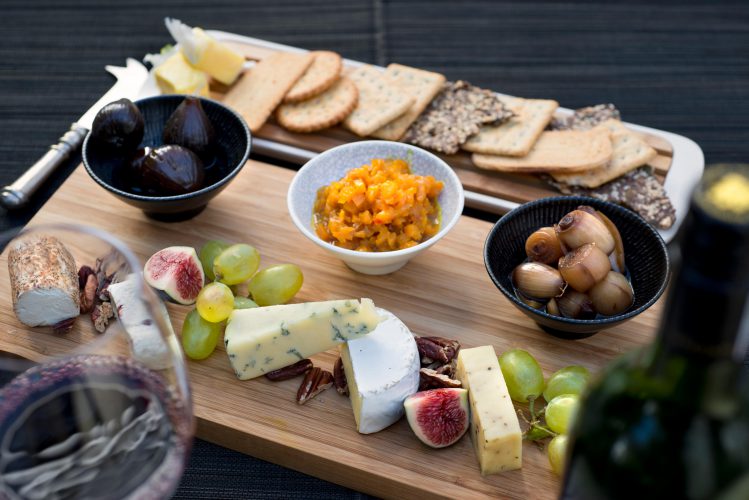The biggest issue you will likely have with regards to your diet 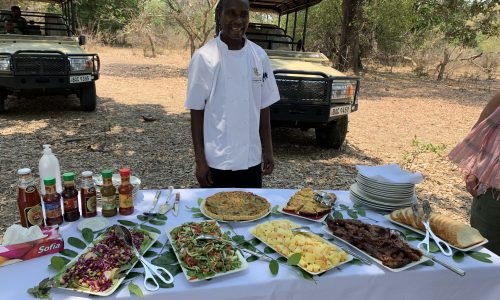 on safari, is the fact that you will need to go on a diet after your safari. The food on a luxury safari is plentiful and excellent. Most safari camps that we book are able to accommodate all kinds of dietary needs, be they gluten-free, kosher, low salt, low-fat, vegetarian or vegan. As long as you make us aware of your dietary restrictions at the time of booking, we make sure that everyone at the safari camp or lodge is aware of your individual needs before you arrive. Susan happily enjoyed fresh baked gluten-free bread on her recent safari in Zambia. Safari camps are often small and intimate, so you can talk to the chef about your dietary needs in person, as well as the camp manager.
on safari, is the fact that you will need to go on a diet after your safari. The food on a luxury safari is plentiful and excellent. Most safari camps that we book are able to accommodate all kinds of dietary needs, be they gluten-free, kosher, low salt, low-fat, vegetarian or vegan. As long as you make us aware of your dietary restrictions at the time of booking, we make sure that everyone at the safari camp or lodge is aware of your individual needs before you arrive. Susan happily enjoyed fresh baked gluten-free bread on her recent safari in Zambia. Safari camps are often small and intimate, so you can talk to the chef about your dietary needs in person, as well as the camp manager.
If you have food allergies, these can also be accommodated. 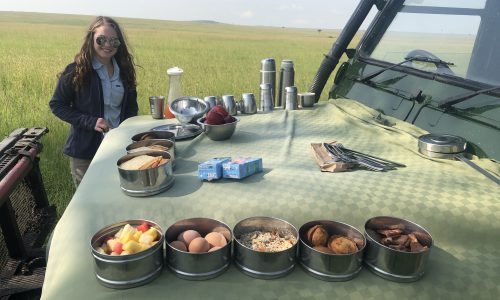 But if it’s a life-threatening allergy make sure you carry your epi-pen with you at all times, including game drives. You don’t want to miss out on a surprise bush dinner or breakfast! Anouk has lots of experience traveling with her son who has severe food allergies, so ask her if you have concerns about taking a trip to Africa.
But if it’s a life-threatening allergy make sure you carry your epi-pen with you at all times, including game drives. You don’t want to miss out on a surprise bush dinner or breakfast! Anouk has lots of experience traveling with her son who has severe food allergies, so ask her if you have concerns about taking a trip to Africa.
Some dietary requests may require an additional supplement to be paid, but most will be accommodated without incurring extra charges. If you follow a strict kosher diet, and the camp does not have a kosher kitchen, they may need to fly in your food specially at extra cost. However, there are safari lodges like the Royal Malewane that have a kosher kitchen.
Exercise
Going for a morning run to try and lose some of the pounds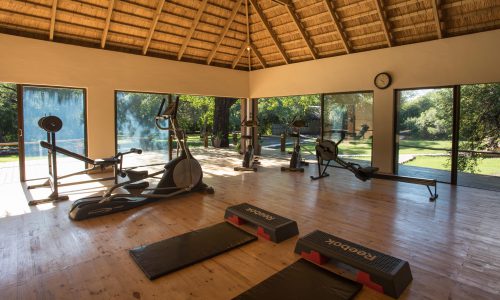 you have gained while on safari, is not recommended. In fact, it’s really not allowed unless you can persuade an armed tracker to go along with you! What we recommend is to bring a jump rope or practice an exercise routine that you can follow in the comfort of your camp (many camps have yoga mats in the rooms), and stay slim and safe that way. Some of the larger camps and lodges do have gyms, so if exercising is an important factor for you while on safari, make sure you let us know.
you have gained while on safari, is not recommended. In fact, it’s really not allowed unless you can persuade an armed tracker to go along with you! What we recommend is to bring a jump rope or practice an exercise routine that you can follow in the comfort of your camp (many camps have yoga mats in the rooms), and stay slim and safe that way. Some of the larger camps and lodges do have gyms, so if exercising is an important factor for you while on safari, make sure you let us know.
Fresh Fruits, Salads and Veggies
When traveling in developing countries it’s sometimes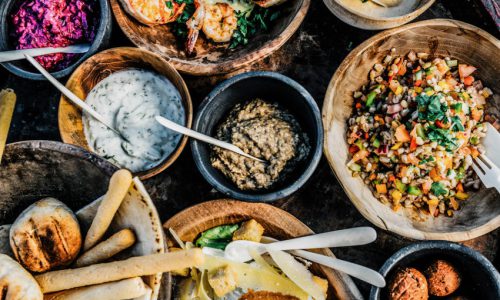 recommended that you avoid salads, fresh vegetables, and fruits that can’t be peeled. But on a luxury safari you don’t have to avoid any of these delicious foods. It would be a crime not to eat them, as they are frequently grown locally, guaranteed to be organic, and free of pesticides. Luxury camps and lodges make sure to wash the fruits and vegetables in clean water, they know your stomach would be sensitive to anything else, and they don’t want guests falling ill. If you stop by a roadside market to purchase fresh fruit, then please do make sure to wash them with safe drinking water before eating!
recommended that you avoid salads, fresh vegetables, and fruits that can’t be peeled. But on a luxury safari you don’t have to avoid any of these delicious foods. It would be a crime not to eat them, as they are frequently grown locally, guaranteed to be organic, and free of pesticides. Luxury camps and lodges make sure to wash the fruits and vegetables in clean water, they know your stomach would be sensitive to anything else, and they don’t want guests falling ill. If you stop by a roadside market to purchase fresh fruit, then please do make sure to wash them with safe drinking water before eating!
Is the Water Safe to Drink?
The best luxury safari camps are often at the forefront of 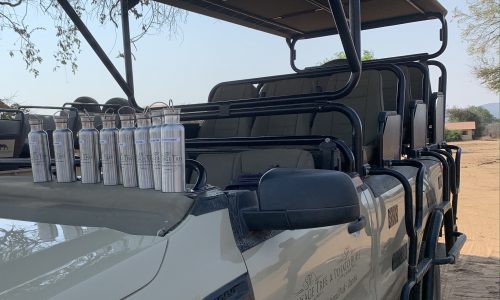 conservation efforts and do their utmost to minimize their environmental footprint. Bottled water creates a huge amount of waste, and recycling facilities are few and far between in the African bush. Your camp manager will make sure you have water that is safe to drink in your room, and will let you know what water to avoid if necessary. Your drinking water will often be in a flask or pitcher. You can assume whenever the staff pours you a glass of water, rather than hand you a bottle, that it is safe to drink. We suggest you minimize your own plastic waste by bringing a re-fillable water bottle with you on safari, and fill it from a safe source at camp.
conservation efforts and do their utmost to minimize their environmental footprint. Bottled water creates a huge amount of waste, and recycling facilities are few and far between in the African bush. Your camp manager will make sure you have water that is safe to drink in your room, and will let you know what water to avoid if necessary. Your drinking water will often be in a flask or pitcher. You can assume whenever the staff pours you a glass of water, rather than hand you a bottle, that it is safe to drink. We suggest you minimize your own plastic waste by bringing a re-fillable water bottle with you on safari, and fill it from a safe source at camp.
If you are staying in a city or town, and the tap water is deemed safe to drink – we recommend you stick with bottled water. In this case there are usually recycling facilities available, and even though you are unlikely to get seriously ill from the tap water, your stomach may not be used to the minerals and salts in it. You don’t want an upset stomach while enjoying your vacation.
Don’t Snack in Bed and Keep Sweets to Yourself
Vervet monkeys are awfully cute, until they ransack your tent  and eat your snacks. Baboons are highly adept at opening tent zips and helping themselves to your chocolate stash. If you need to have snacks on hand for health reasons, ask the kitchen staff to keep them stored in a safe place, or bring a couple of small airtight containers with you. If you are staying at a lodge and you see staff wandering around with slingshots … you know there’s an issue with thieving monkeys!
and eat your snacks. Baboons are highly adept at opening tent zips and helping themselves to your chocolate stash. If you need to have snacks on hand for health reasons, ask the kitchen staff to keep them stored in a safe place, or bring a couple of small airtight containers with you. If you are staying at a lodge and you see staff wandering around with slingshots … you know there’s an issue with thieving monkeys!
A final note on sweets and snacks: Please do not brings sweets and treats for local children while you are on safari. Handing out treats will encourage some children to stay away from school in the hopes of a tourist coming by to hand out chocolates or candy. Dentists are also very expensive and difficult to come by in rural Africa, so help their parents out by not spoiling the children!
Contact us for more information and to chat about your dietary options while on safari.
